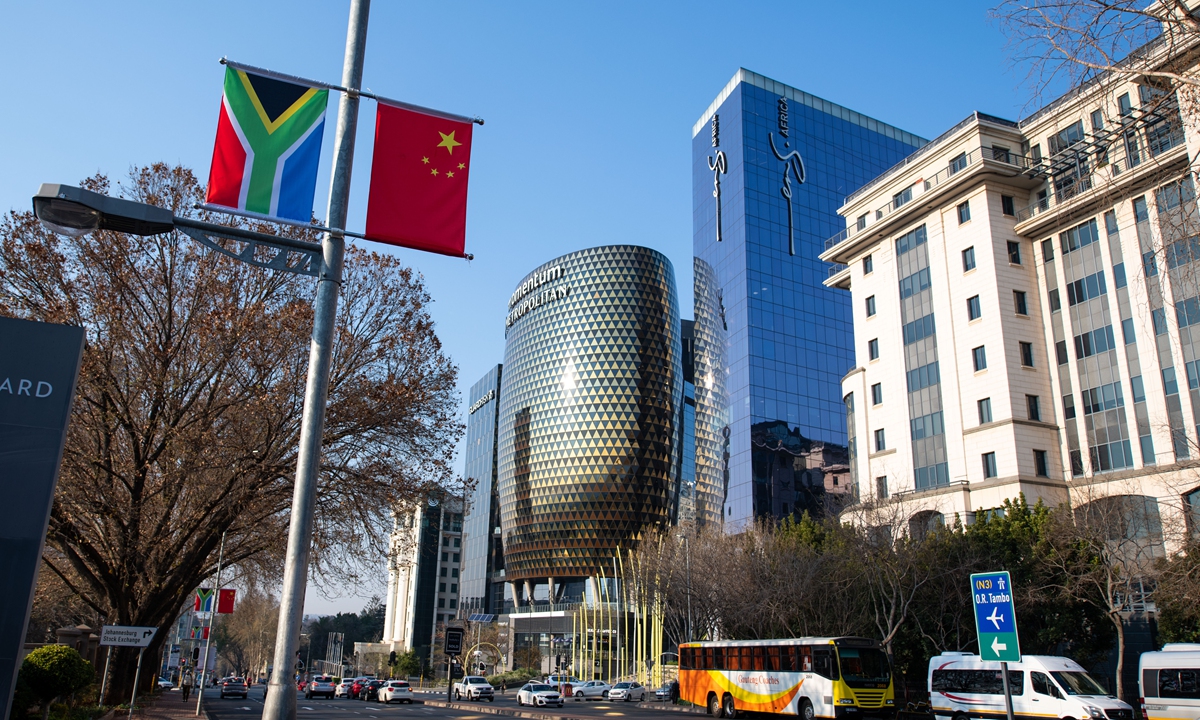Amid high global attention and expectations, Chinese President Xi Jinping left Beijing for Johannesburg on Monday for a state visit to South Africa and to attend the BRICS Summit to be held from Tuesday to Thursday.
The visit is being widely welcomed by local scholars, who see it as a strong boost to deep-rooted China-South Africa relations as the two countries celebrate the 25th anniversary of the establishment of the bilateral diplomatic relations in 1998.
Observers also believe that Xi’s visit to the continent, coming against the backdrop of aggravating geopolitics, can inject momentum into China-Africa cooperation, and help developing countries and emerging economies jointly seek an approach to address current global challenges.
The ambiance of the BRICS Summit became palpable upon Global Times reporter’s arrival at Johannesburg airport. Posters and billboards publicizing the event can be seen everywhere.
National flags of South Africa and China are fluttering atop roadside poles en route to Mahlamba Ndlopfu, the official residence for the President of the Republic of South Africa in Pretoria.
Local residents, when seeing visitors from China, extended warm greetings and expressed their affection for the remote country. Many asked for a selfie with the reporter and told the Global Times they wanted to visit China one day, underscoring the positive rapport between the two countries and peoples.
China is an important investor in South Africa and provides support to the infrastructure development projects including the Small Harbour Development Project, the TVET Refurbishment Project and the Mzimvubu Water Project, all of which are instrumental in job creation, according to a statement sent to the Global Times by Government Communication and Information System on behalf of the Presidency of South Africa.
The welcome ceremony for Xi will take place on Tuesday morning, and discussions during Xi’s state visit will explore further collaboration and partnerships the two nations can leverage to solidify existing diplomatic, economic and people-to-people relations, according to the statement.
‘Brotherly sentiments’
President Xi on Monday published a signed article in English entitled “Sailing the giant ship of China-South Africa friendship and cooperation toward greater success” on major media outlets in South Africa.
The ongoing visit is Xi’s sixth to the “promising land of the ‘rainbow nation,'” and Xi wrote that “Each of my visits to South Africa gave me new impressions. But the deepest is invariably the brotherly sentiments we have toward each other.”
Paul Tembe, author of the book Xi Jinping and Thriving China-South Africa Relations in the New Era, was impressed by the warmth and close bond carried in Xi’s article.
“Whenever President Xi visits South Africa, he always brings gifts. I am not referring to physical gifts, but intangible, symbolic gifts that expand our relationship,” Tembe told the Global Times on Monday in Pretoria.
Xi wrote in the article that “Our friendship has traversed a long span of time,” citing examples of China’s support in South Africa’s fight against apartheid in the mid-20th century. China was among the first to provide anti-COVID pandemic supplies to South Africa and recent aid of emergency power equipment amid the latter’s energy crisis.
“Our relationship has entered a ‘golden era,’ enjoying broad prospects and a promising future… South Africa was the first African country to sign the Belt and Road cooperation document with China. It has been China’s biggest trading partner in Africa for 13 years in a row, as well as one of the African countries with the largest stock of Chinese investment,” Xi wrote.
Bilateral trade in the first seven months of 2023 reached 226.15 billion yuan ($31.06 billion) with a year-on-year increase of 10.5 percent, data from China’s General Administration of Customs (GAC) showed.
China imports raw materials and resources from South Africa and helps in infrastructure and telecommunication, while analysts pointed out that potential for cooperation also lies in areas of South Africa’s upgrading of its industrial pattern, digital economy and technological transfer and ocean economy.
Song Wei, a professor with the School of International Relations and Diplomacy at Beijing Foreign Studies University, told the Global Times on Monday the two countries can also enhance cooperation and exchanges in the fields of culture, tourism and education and training.
In his signed article, Xi specified four objectives for bilateral relations – China and South Africa should be fellow companions sharing the same ideals, pacesetters for solidarity and cooperation, inheritors of China-Africa friendship, and champions of common interests.
Beyond bilateral
China-South Africa relationship has gone beyond the bilateral scope and carries increasingly important global influence, Xi wrote.
While in South Africa, Xi will co-chair with President Cyril Ramaphosa the China-Africa Leaders’ Dialogue, according to the Chinese Foreign Ministry.
Analysts believe that South Africa, as a major country in a promising land full of opportunities, can play a key role in driving the continent’s cooperation with China and facilitate Africa’s economic integration, industrialization and modernization.
David Monyae, director of the Center for Africa-China Studies at the University of Johannesburg, told the Global Times that China has made great contributions to Africa’s development. Programs under the China-proposed Belt and Road Initiative (BRI) have benefited local people and China has done this out of true care for Africa’s development, Monyae said.
Tembe also hailed the advantages of BRI, which is not abstract but practical and substantial.
In the first half of 2023, China added $1.82 billion in foreign direct investment (FDI) to Africa, up by 4.4 percent year-on-year. Chinese companies have become increasingly confident in the African market. More than 3,000 Chinese enterprises have invested deeply in Africa, of which over 70 percent are private companies, Chinese Foreign Ministry spokesperson Wang Wenbin said at the routine press briefing on August 18.
In many Chinese companies operating in Africa, over 80 percent of the staff are local employees. Chinese companies have given back to local communities by building bridges and roads, drilling wells and installing street lights. At the same time, they have increased technology transfer, local procurement and personnel training in Africa, and helped modernize the continent’s agricultural, manufacturing and services sectors, Wang said.
Analysts said that China’s cooperation with Africa has not only brought about opportunities for Africa to share in the fruits of development, but also provide inspiration for how developing countries should seek a path of modernization that suits their own national conditions.
Xi highlighted the completion and handover of a host of projects including the Africa CDC Headquarters, the Foundiougne Bridge in Senegal, the Nairobi Expressway and the Mombasa-Nairobi Railway in the past decade of joint pursuit of a China-Africa community with a shared future in the new era.
In face of the profound changes unseen in a century, a strong China-Africa relationship and productive China-Africa cooperation will provide more fresh impetus to global development and ensure greater stability in the world, Xi wrote in his signed article.
This is all the more reason why China and South Africa, as natural members of the Global South, should work together to appeal for a greater voice and influence from developing countries in international affairs, and Xi called for joint opposition to unilateral sanctions and the “small yard, high fence” mentality to jointly safeguard the common interests.
Sanusha Naidu, senior research fellow at Institute for Global Dialogue, told the Global Times in Johannesburg that BRICS exists simply because there was a need for the BRICS format. “BRICS in itself is an iteration and an expression of the Global South.”
BRICS is of extraordinary importance when the world faces joint challenges of a post-pandemic recovery and rising geopolitical tensions, as developing countries prioritize growth over differences in ideologies and systems, analysts said.
The theme of the upcoming BRICS Summit, its focus on Africa and agenda of closer financial cooperation and expansion of membership, prove that the mechanism continues to serve the immediate needs of developing countries, Lan Qingxin, director of the Center for BRICS Studies at the University of International Business and Economics in Beijing, told the Global Times on Monday.
BRICS is a platform for developing countries to make their voice heard and work together for their benefits. It has never sought and will never seek to confront the Group of Seven (G7) or any other mechanisms, Lan said. He added that the unprecedented attention to a BRICS event and continuous attacks out of a confrontational mentality just demonstrated the necessity and urgency for fairer and more inclusive global governance.













